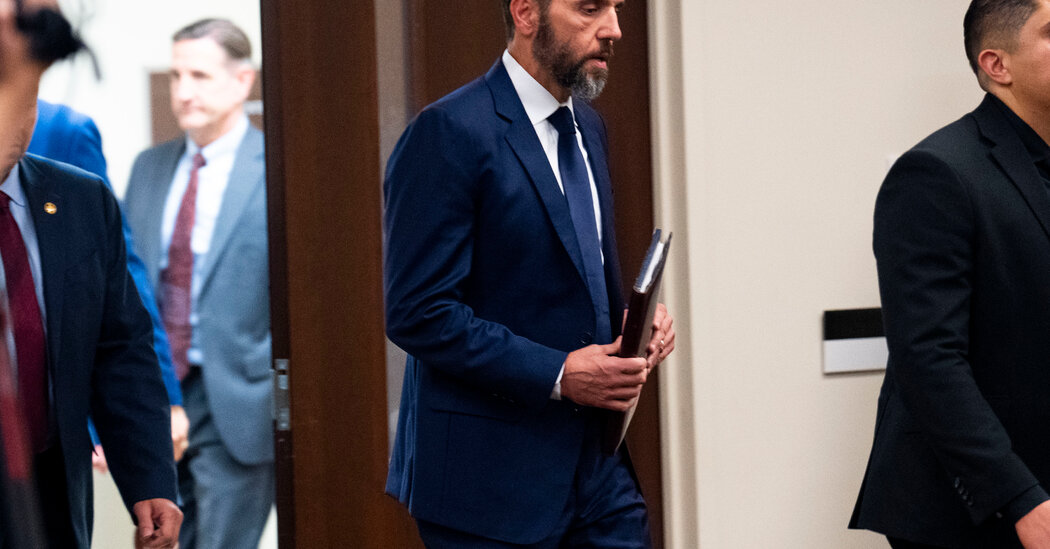A federal judge in Florida cleared the way on Monday for the Justice Department to soon release a portion of a report written by the special counsel, Jack Smith, detailing the decisions he made in charging President-elect Donald J. Trump with plotting to overturn his loss in the 2020 election.
But in a five-page order, the judge, Aileen M. Cannon, ruled that prosecutors and defense lawyers would have to appear before her in court on Friday to argue over whether the Justice Department could release to members of Congress the part of Mr. Smith’s report dealing with the case she oversaw: the one in which Mr. Trump was accused of refusing to return classified documents after he left office.
Under the ruling, the Justice Department would be free to release the part of the report about the election case as early as Monday night or Tuesday morning. Mr. Trump’s lawyers could still ask an appeals court or the Supreme Court to stop that part of Mr. Smith’s report from coming out.
Judge Cannon’s order, filed in Federal District Court in Fort Pierce, Fla., was the latest twist in a weeklong battle over the release of the two-volume report, which represents Mr. Smith’s final word on the two defunct criminal cases he brought against Mr. Trump.
In one of those cases, overseen by Judge Cannon in Florida, Mr. Trump was charged with illegally holding on to a trove of state secrets after leaving office in 2021 and then conspiring with two of his aides to obstruct the government’s efforts to retrieve the material. In the other case, filed in Federal District Court in Washington, he was accused of three intersecting conspiracies to illegally maintain his grip on power after losing the presidential race.
The Justice Department has already said that Attorney General Merrick B. Garland wants to release the volume about the classified documents case privately to congressional leaders, not to the public, because the matter is still active against two aides to Mr. Trump who were charged with him as co-defendants.
But lawyers for the co-defendants, Walt Nauta and Carlos De Oliveira, said that plan was risky and expressed concern that the members of Congress might leak the contents of the volume.
In her order, Judge Cannon agreed with the defense lawyers and barred the Justice Department from showing that section of the report to anyone until the completion of all proceedings in the classified documents case.
“The court is not willing to make that gamble on the basis of generalized interest by members of Congress, at least not without full briefing and a hearing on the subject,” she wrote.
The Justice Department has been fighting on numerous fronts to get Mr. Smith’s report into the public eye even though he formally stepped down from his post as special counsel on Friday.
Prosecutors had already appealed Judge Cannon’s original order blocking the release to a federal appeals court in Atlanta — the same court that had previously overturned one of her other unusual rulings in Mr. Trump’s favor. Prosecutors argued to the appeals court that she had no jurisdiction to issue the delay order in the first place, let alone extend it, but Judge Cannon proceeded anyway.
But Judge Cannon, in her order, asserted that she did have proper authority at least over the classified documents section of Mr. Smith’s report. She asserted jurisdiction in the issue because the release of the report could affect the cases of Mr. Nauta and Mr. De Oliveira.
After Mr. Trump won the 2024 election, Mr. Smith dropped both cases against him, bowing to a longstanding Justice Department policy that prohibits pursuing criminal prosecutions against sitting presidents.
While Mr. Trump will not stand trial in either case, Justice Department regulations call for special counsels to write final reports when they finish their work. In recent years, attorneys general have released such reports — including for the inquiry into Russian interference in the 2016 election, the counter-investigation into that inquiry’s origins and the scrutiny of President Biden’s handling of classified documents — as highly detailed explanations of their findings for public understanding and history.
For more than a week, Mr. Trump’s legal team has been fiercely fighting to stop any part of Mr. Smith’s report from coming out, calling it a “one-sided” and “unlawful” attack on the president-elect. The lawyers have also expressed concern that the report could prove damaging or embarrassing to some unnamed but “anticipated” members of Mr. Trump’s administration.
Judge Cannon dismissed the classified documents case this summer on the grounds that Mr. Garland lacked the authority to appoint Mr. Smith — a ruling that conflicted with decades of higher-court precedent and Justice Department practice. Mr. Trump’s lawyers have used that ruling as another argument for why the report should be blocked from coming out, but the department has also appealed the ruling to the same appeals court in Atlanta.
The election interference case, which was brought before Judge Tanya S. Chutkan of the Federal District Court in Washington, is also dead after being significantly slowed by a Supreme Court ruling in July that presidents are presumptively immune from prosecution over their official actions. When the case could not be brought to trial before the election and Mr. Trump won, Mr. Smith was forced to drop the charges under the department’s prohibition against prosecuting sitting presidents.
Federal Criminal Case Against Trump (Documents Case),Justice Department,Cannon, Aileen M,Smith, Jack (Attorney),Trump, Donald J
#Judge #Release #Special #Counsels #Report #Trump #Cases
